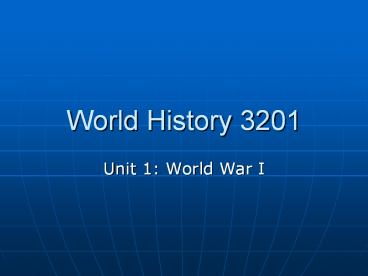World History 3201 - PowerPoint PPT Presentation
Title:
World History 3201
Description:
World History 3201 Unit 1: World War I Unit 1: World War I (1914-1918) The sources of tension that triggered outbreak of World War I Causes Major events Role of ... – PowerPoint PPT presentation
Number of Views:307
Avg rating:3.0/5.0
Title: World History 3201
1
World History 3201
- Unit 1 World War I
2
Unit 1 World War I (1914-1918)
- The sources of tension that triggered outbreak of
World War I - Causes
- Major events
- Role of science and technology
- Process ending World War I
3
The sources of tension that triggered outbreak of
World War I
- No one event or person caused the Great War.
There were many factors that contributed to
mobilization of the belligerents. - Tension grew between the leading nations of
Europe, as a result of growing strain placed upon
their relationship with each other. - There were at least four underlying causes of the
first World War.
4
Four Underlying Causes of WWI
- 1. Nationalism
- 2. Economic Rivalry (imperialism)
- 3. The Arms Race
- 4. The Alliance System
5
Nationalism
- Nationalism is an intense sense of loyalty and
pride in ones nation (beyond patriotism). - At the start of the 20th century many countries
such as Germany, Britain, Russia and France had
an aggressive sense of their own superiority and
destiny that fuelled the outbreak of war.
6
Political Nationalism
- Alsace-Lorraine (Political Nationalism) two
French provinces taken by Germany after the
Frances humiliating defeat of the Franco-Prussian
War of 1871. - This region bordered France and Germany, and was
very valuable. - German possession of this region was a source of
French resentment and became the focus of French
Nationalism and Anti-German sentiment.
7
Economic Nationalism
- Germany only became a unified state after the
Franco-Prussian War (1871) - France in their defeat ceded Alsace-Lorraine.
- Germany boomed after unification, wanting
colonies for resources to maintain its thriving
economy and to compete with other imperialistic
powers - Britain, France, Belgium had long maintained
colonies. Germany now wanted their own empire and
to become a major power.
8
Ethnic Nationalism
- Austria-Hungary was a country where many
different groups lived together. - Many of these groups had different religions,
languages and cultural traditions. Control was
maintained and controlled as a part of the
Ottoman Empire, ruled by the Hapsburg Dynasty. - Many of these groups were not happy with this
type of control and wanted to have their own
autonomy (Croats, Poles, Slovaks, Serbs, Czechs) - Russia took an interest in this region and began
to interfere in a quest to unite the Slavic
people in the region (Pan-Slavism).
9
Britain (Pax Brittania)
- World power that had a vast empire and a powerful
armed forces, particularly its navy. - Led by a sense of duty to the Monarchy.
- Britains international interests and power helped
maintain a period of relative peace prior to WWI. - They became suspicious of up and coming rivals
like Germany and Japan/
10
Economic Rivalry
- Nations such as Britain, France and Germany
aggressively competed for world markets and
resources. - Imperialistic activities in parts of Africa and
Asia created tension between these competing
countries. - Their rivalries often came close to violence in
continents such as Africa.
11
The Arms Race
- Due to imperialistic expansion, nations needed a
means to protect their interests. - Most nations were actively building up their
military and even began drawing up detailed plans
for a future war. (Germanys Schlieffen Plan,
and Frances Plan 17) - England and Germany engaged in a deadly naval
race. (German began to challenge Englands Naval
supremacy.)
12
The Alliance System
- Most of the large nations in Europe were members
of two powerful alliances the Triple Entente
(Britain, France and Russia) and the Triple
Alliance (Germany, Austria-Hungary, and Italy). - These alliances also involved the overseas
empires such as those of Britain and France. - The results of these alliances was to increase
tension and suspicion and turn a disagreement
between two nations into a full blown war.
13
(No Transcript)
14
Ultimatum
- a final demand or statement of terms, the
rejection of which will result in retaliation, a
breakdown in relations or a declaration of war.































